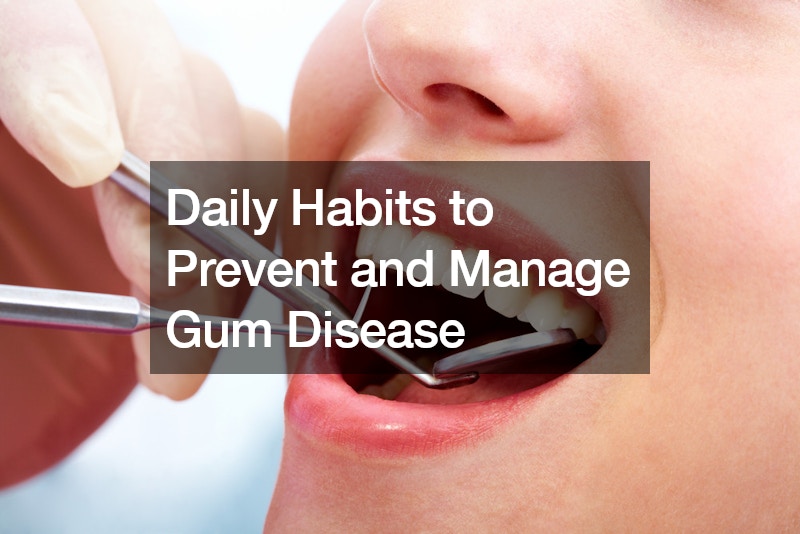Gum disease, also known as periodontal disease, is a common condition that affects the tissues surrounding the teeth. It is caused by the buildup of plaque, a sticky film of bacteria that forms on the teeth. If left untreated, gum disease can lead to serious complications such as tooth loss and bone damage. However, the good news is that gum disease is preventable and manageable with the right daily habits. In this article, we will discuss some simple yet effective practices to prevent and manage gum disease.
1. Brushing Twice Daily:
Brushing your teeth twice a day is a fundamental habit for preventing gum disease. Using a soft-bristled toothbrush and fluoride toothpaste, gently brush your teeth in circular motions. This removes plaque and food particles from the teeth and along the gumline, reducing the risk of gum disease. By incorporating this simple routine into your daily life, you can maintain optimal oral health and prevent common dental issues.
2. Flossing Daily:
Flossing is another crucial aspect of maintaining healthy gums. It helps remove plaque and debris from between the teeth and along the gumline, where your toothbrush may not reach. Proper flossing technique is essential to avoid injuring your gums. By flossing at least once a day, you can effectively remove harmful bacteria and reduce your risk of developing gum disease.
3. Using an Electric Toothbrush:
Consider upgrading to an electric toothbrush for more effective plaque removal. Electric toothbrushes use oscillating or rotating bristles to clean the teeth and gums thoroughly. They are particularly beneficial for individuals with gum disease, as they provide gentle yet thorough cleaning. By incorporating an electric toothbrush into your daily oral hygiene routine, you can enhance your gum health and prevent dental problems.
4. Incorporating a Water Flosser:
Water flossers, also known as oral irrigators, offer an alternative to traditional flossing. They remove plaque and bacteria from between the teeth and below the gumline using a stream of water. This makes them ideal for individuals with gum disease or those who have difficulty using traditional floss. By incorporating a water flosser into your daily routine, you can improve your gum health and maintain a cleaner mouth.
5. Using Interdental Brushes:
Interdental brushes are small, cone-shaped brushes designed to clean between the teeth and around dental work such as braces, bridges, and implants. They effectively remove plaque and food particles from tight spaces, complementing traditional flossing. By using interdental brushes in conjunction with flossing, you can ensure thorough cleaning and reduce your risk of gum disease.
6. Regular Dental Check-ups:
Visiting your dentist regularly is crucial for preventing and managing gum disease. Your dentist can identify early signs of gum disease and provide professional cleanings to remove hardened plaque (tartar) that cannot be removed with regular brushing and flossing. Additionally, they can offer personalized advice on maintaining good oral hygiene habits. Regular dental check-ups are essential for maintaining optimal gum health and preventing dental problems.
7. Using a Tongue Scraper:
Don’t overlook the importance of cleaning your tongue as part of your daily oral hygiene routine. Bacteria and food debris can accumulate on the tongue’s surface, contributing to bad breath and oral bacteria. Using a tongue scraper to gently remove this buildup can improve overall oral hygiene and prevent gum disease.
8. Avoiding Tobacco Products:
Smoking and chewing tobacco significantly increase the risk of gum disease and other oral health problems. If you use tobacco products, consider quitting to improve your oral health and reduce your risk of gum disease. By avoiding tobacco products, you can protect your gums and maintain a healthy mouth.
9. Eating a Balanced Diet:
A healthy diet plays a crucial role in maintaining gum health. Avoid sugary snacks and beverages, which can contribute to plaque buildup and tooth decay. Instead, opt for nutritious foods such as fruits, vegetables, lean proteins, and dairy products, which provide essential nutrients for strong teeth and gums. By eating a balanced diet, you can support gum health and reduce your risk of gum disease.
10. Managing Stress:
Stress can weaken the immune system and increase inflammation in the body, including the gums. Practice stress-reducing techniques such as deep breathing, meditation, yoga, or regular exercise to promote overall health and reduce your risk of gum disease. By managing stress effectively, you can support your immune system and maintain optimal gum health.
In conclusion, maintaining good oral hygiene habits is key to preventing and managing gum disease. By brushing and flossing daily, using appropriate oral hygiene tools, visiting your dentists regularly, and adopting a healthy lifestyle, you can protect your gums and enjoy a lifetime of healthy smiles. Remember, your dentist is your partner in oral health and can provide valuable guidance and support in preventing and managing gum disease.
.







